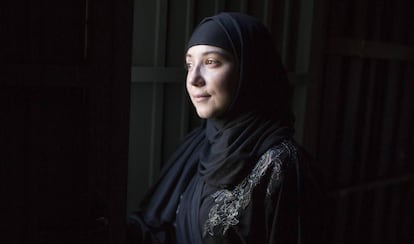From María to Maryam: a 29-year-old Spaniard converts to Islam
In mid-July, this non-practicing Christian finally embraced her new faith after several years practicing informally

The day that Maryam’s cellphone rang out the adhan, the Muslim call to prayer, her parents were understandly puzzled. “They said their hearts skipped a beat because I had never told them to their faces that I had embraced Islam,’” she explains just days after her conversion.
Maryam grew up in a non-practicing Christian home in Fuenlabrada, a working-class suburb of Madrid. She was christened Maria and celebrated her first communion but says she doesn't remember ever going to mass.
Now, at the age of 29, she has converted to Islam, a processs she says took place over the last decade, beginning when she was 19 and her Moroccan-born boyfriend gave her a book that began this gradual process of change. “It wasn't the Koran. It was simply called Islam and it was on sale at the book fair. It awoke my curiosity but it didn't make me believe immediately,” she recalls.
She began to look deeper into Islam, reading biographies of its prophets watching documentaries and finally tackling the Koran itself.
I know that the day I go out with my parents wearing the hijab and a friend sees us, it won’t be easy
Maryam
“I had a very normal childhood and adolescence. When I was 17 or 18, I spent all day out with my friends,” she says, automatically touching a finger to her lip where the scar from a piercing is still visible.
As her knowledge of Islam grew, she started to change her lifestyle. She never hid anything from her parents, but neither did she explain what was going on. She wanted them to find out in as “natural” way as possible so that it wouldn’t come as a blow.
She introduced them to her boyfriend and started to drop small hints – “messages”, she calls them. “I left books on Islam around. They noticed that I was changing and that I spent more time at home and didn't go to the swimming pool as much as before,” she says.
When Maryam speaks about her parents, a barrier goes up. She wants to protect them because she knows they are still scared. “It's not to do with their reaction because we live together and they can see that it's been good for me; that I don't drink, or smoke or take drugs. They can see that I go to work and back and lead a healthy, peaceful life. But I don't want to put any pressure on them or make them feel bad in any way because it's a sensitive issue,” she says.
Maryam’s biggest fear is fear itself; the fear that she might stir in those outside her family. “I know how these things work and what society is like,” she says. “I know that the day I go out with my parents wearing the hijab and a friend sees us, it won’t be easy. When people see a convert, they think, ‘where have their parents failed?’ That's what I want to spare them. I don't want them to suffer.”
Because of this, Maryam is managing her conversion on two levels, combining her own culture with her adopted faith. She’s in no hurry. For example, she doesn't cover her head when she goes out with her family. “They have seen the scarves and the abayas [long over garments], but they have never seen me dressed like that,” she explains. “Allah wiling, I’m going to be around for a while, so it's better to go slowly.”
She knows she has a conversation pending with her parents, but she also feels supported and respected. “My mother has been taking the pork out of my food for a while. When we painted the house and I lost my Koran, everyone helped to look for it. I haven't said openly that I am Muslim, but I haven't really needed to,” she says. “I'm sure they have a load of doubts and questions it hasn’t been the right time to broach the subject.”
For the past eight years, Maryam has worked at a fast food franchise and doesn’t wear the hijab during working hours. She says there was no point in asking if she could because she knew the answer would be no Maryam
Maryam has spent the last three years observing Ramadan. She went to the mosque on the M-30, which is her favorite and to her boyfriend’s family home where she celebrated Iftar, the dinner that marks the end of Ramadan. But this year, something changed. “Last Monday, I got up and decided I didn’t want to spend another second not being Muslim. I considered I had enough knowledge to take the step; it’s been a long time,” she explains.
She asked her closest friends and her boyfriend to come to the mosque in Al Sunna, the Islamic center in Fuenlabrada. And there, in front of an Imam, she recited the Shahada – one of the five pillars of the Muslim faith containing the precepts of Islam.
“I pronounced the Arabic very badly. I was very nervous because I’d been wanting to do this for a long time. I got tearful and lost my place,” she recalls smiling. “It was very emotional, I felt at peace. You can do it alone in private or with more people. I decided to do it as I did because it's good for the community.”
She is planning to marry her boyfriend but she insists on separating the two things. “I know that 99% of people will think I have converted for love, that I have done this for a boy,” she says. “But he would be the first to say that would be wrong. It shouldn't be an obligation. It has to come from the heart. He wouldn't have let me recite the Shahada for him because it's not fair to either of us.”
Maryam says that if the marriage doesn't work, she will continue in the Islamic faith. “I have converted for myself. That's the truth. It's not as though one day I got up and said, ‘I believe’; it's a belief I have acquired gradually.”
Every time she says the word ‘respect’, Maryam holds out the palms of her hands and her voice softens. “People can think what they like, that I have been brainwashed or that I am doing it for my boyfriend. And although they are wrong, I am not going to judge them,” she says.
For the past eight years, Maryam has worked at a fast food franchise and doesn’t wear the hijab during working hours. She says there was no point in asking if she could because she knew the answer would be no. As far as her workmates are concerned, however, she says, “They have been the easiest to tell about the conversion because I don’t care if they judge me or not. They love me as I am.”
Like the majority of Muslims, Maryam believes that Spanish society is steeped in prejudice where Islam is concerned. In part, she blames the media for distorting the truth and focusing on the negative. She looks sad when she talks about Syria or the attacks on Brussels, pulling a face when she mentions the so-called Islamic State. “Religion gets confused with culture,” she says. “It's true that there are Muslim countries where violence against women goes unpunished, but it is not allowed in Islam. It is not the religion that’s to blame, it is the people and a lack of education,” she says.
Maryam adds that she feels more valued as a woman now than in her previous life. “Islam is not chauvinistic. There is an entire Sura dedicated to women! Under a mother's feet is paradise,” she says, reciting the Koran.
She also addresses the assumption of submission in Islam, insisting that one of the reasons she has converted is to avoid feeling limited or constrained. “If I couldn't work or go out with a friend or do things I want to do, like in countries where women can't drive, I wouldnt have converted. I'm not stupid,” she insists.
For Maryam, conversion brought her a feeling of liberation: she says she feels happier and more satisfied with her new, which she describes as “more balanced”.
“I wear a headscarf when I go out and I feel free. Isn't that strange? When I put on the scarf and see that nobody looks at me and nobody annoys me, that to me is freedom. To be able to wear what I like, covering myself up,” she says.
Sign up for our newsletter
EL PAÍS English Edition has launched a weekly newsletter. Sign up today to receive a selection of our best stories in your inbox every Saturday morning. For full details about how to subscribe, click here
Comparing herself to girls who opt for skimpy garments, she adds, “They think there is nothing wrong with dressing like that. I think the same about covering myself up. I'm not hurting anyone. It’s good for me.”
Maryam remembers when she felt the first glimmer of faith. And she can tell you the exact moment she knew she had been born a Muslim and had to be reunited with Allah. She imagines what people will think of her but she is not worried about the future, using the Arabic term “inshallah”.
But for now she will continue to study Arabic and focus on helping to alleviate her family's fears. But because of the nature of her conversion, she is confident that their fears can be managed. She can't remember when she stopped being Maria to become Maryam. “It's easier for Muslims to pronounce and so they started to call me that,” she explains.
"The real challenge will be learning how to combine my own culture with my adopted culture and the hijab, for example," she says adding that she is Maryam and also Maria.
English version by Heather Galloway.
Tu suscripción se está usando en otro dispositivo
¿Quieres añadir otro usuario a tu suscripción?
Si continúas leyendo en este dispositivo, no se podrá leer en el otro.
FlechaTu suscripción se está usando en otro dispositivo y solo puedes acceder a EL PAÍS desde un dispositivo a la vez.
Si quieres compartir tu cuenta, cambia tu suscripción a la modalidad Premium, así podrás añadir otro usuario. Cada uno accederá con su propia cuenta de email, lo que os permitirá personalizar vuestra experiencia en EL PAÍS.
¿Tienes una suscripción de empresa? Accede aquí para contratar más cuentas.
En el caso de no saber quién está usando tu cuenta, te recomendamos cambiar tu contraseña aquí.
Si decides continuar compartiendo tu cuenta, este mensaje se mostrará en tu dispositivo y en el de la otra persona que está usando tu cuenta de forma indefinida, afectando a tu experiencia de lectura. Puedes consultar aquí los términos y condiciones de la suscripción digital.









































